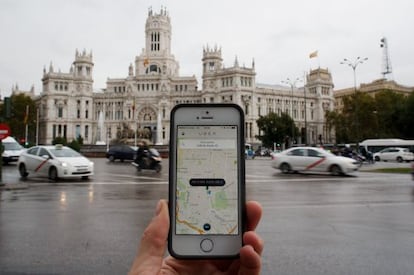Taxi app Uber closes service in Spain in wake of judicial order
Judge had instructed company to cease operations after complaint from taxi association Support services such as credit card firms had already stopped functioning with the app

The car-sharing and taxi application Uber has closed its service in Spain after a judge ordered it to cease all activities on December 9. The head of the company in Spain, Carlos Lloret, announced the decision that the US firm has taken, saying: “We want to respect the law and we have decided to halt the service.”
On December 25, the application ceased working properly in Spain due to reasons outside the control of the company, after support services required for it to function – such as credit card charging – were cut off in accordance with the judge’s instructions. When a customer opened the app, they were either greeted with a message saying that there was a problem with the network connection or that the chosen form of payment was not working.
UberPop is not there for someone to make a living, but rather to earn some extra cash from time to time”
The decision was taken, however, without the judicial order having reached the firm. “We had to go and collect it ourselves,” explained Lloret.
Nine months ago, Uber started operating in Spain using its Pop app, a service that is very similar to the one it uses in the United States under the brand name Uber X. It launched first in Barcelona, then in Madrid and finally in Valencia. Protests from taxi associations have been a constant since it began to operate, given that they feel it is unfair competition – Uber drivers do not have licenses, nor do they have proper insurance to offer rides to passengers. But only in Madrid has legal action got anywhere. The Madrid Taxi Association filed a case in court, and in response a judge ordered the company to cease activities pending the result of the legal action.
But Uber insists that Pop is not competition for established taxi services. “UberPop is not there for someone to make a living,” the company argues. “But rather to earn some extra cash from time to time.”
Spain is not the only country where Uber has run into problems. In France, it will be banned from January 1 onward, despite an appeal filed by the company with the European Commission, which has so far left the decision as to what to do about the app in the hands of each member state. The app has also been banned in more than a dozen countries or cities the world over.
Lloret, however, considers that rejection to be part of the process of implantation. “In San Francisco, where we started out, there were protests at the beginning, until a regulatory framework was created that allowed us to operate normally,” he explained. “The same happened with Airbnb,” he added, in reference to the online service offering rooms to rent all over the world.
At the same time, he admitted that Spain has certain peculiarities. “They haven’t welcomed us with open arms, and we accept that,” he said. “We are new competition in an environment where you have to pay thousands of euros for a license, where there are high taxes and the market is closed, but our view is fixed firmly on the consumer, to offer them a more efficient solution.”
Uber will keep fighting in the courts and hopes to achieve a favorable legal framework within which to operate
The next steps for the application are clear. First, they will return if the regulations change. Secondly, they will keep fighting in the courts and continue to talk to the authorities in the hope of achieving a favorable legal framework within which to operate. And finally they will work to come up with new forms of passenger transport between private citizens that are workable within the current laws.
For now the company is not willing to give a concrete date, but they believe that the closure of Uber in Spain is not definitive. In fact, they are planning on hiring more employees in Spain, although they are unwilling to reveal for now how many people are already working with them in the country.
Uber, which classes itself as a start-up, has a market valuation of $41.2 billion (€33.9 billion).
With the aim of winning support on the social networks, an environment upon which the company has based a lot of its global growth, Uber has published a post on its Spanish blog inviting users to publish customer testimonials on Twitter and Facebook using the hashtag #yoapoyouber (#isupportuber).
Tu suscripción se está usando en otro dispositivo
¿Quieres añadir otro usuario a tu suscripción?
Si continúas leyendo en este dispositivo, no se podrá leer en el otro.
FlechaTu suscripción se está usando en otro dispositivo y solo puedes acceder a EL PAÍS desde un dispositivo a la vez.
Si quieres compartir tu cuenta, cambia tu suscripción a la modalidad Premium, así podrás añadir otro usuario. Cada uno accederá con su propia cuenta de email, lo que os permitirá personalizar vuestra experiencia en EL PAÍS.
¿Tienes una suscripción de empresa? Accede aquí para contratar más cuentas.
En el caso de no saber quién está usando tu cuenta, te recomendamos cambiar tu contraseña aquí.
Si decides continuar compartiendo tu cuenta, este mensaje se mostrará en tu dispositivo y en el de la otra persona que está usando tu cuenta de forma indefinida, afectando a tu experiencia de lectura. Puedes consultar aquí los términos y condiciones de la suscripción digital.








































